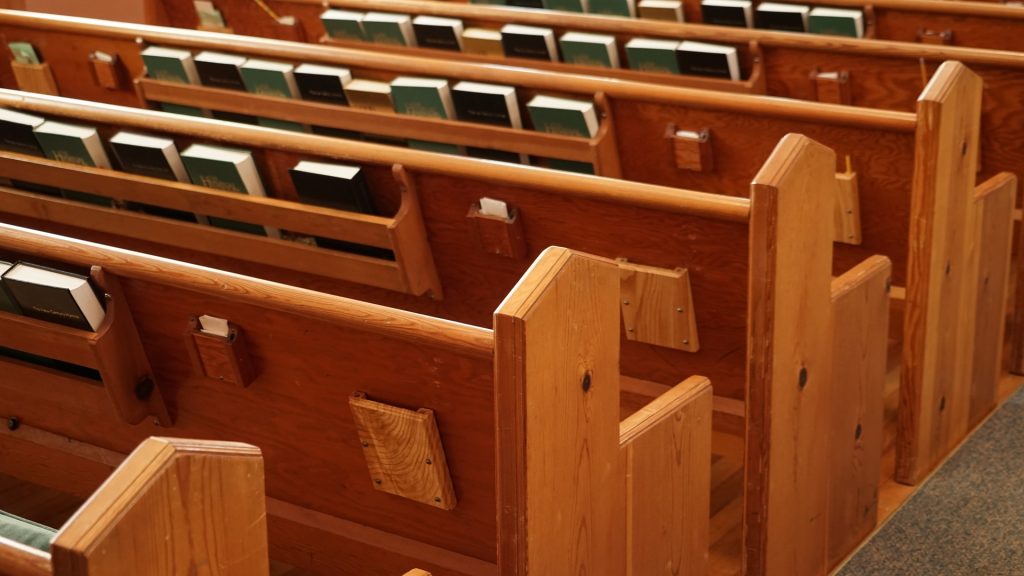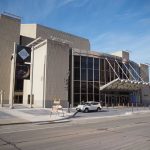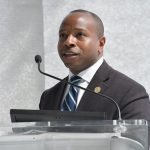Go Slow On Easing Pandemic Rules, Church Group Urges
Wisconsin Council of Churches urges churches to consider needs of vulnerable people.
While COVID-19 cases drop and the federal government is suggesting that it’s now safe for people to forgo masks in much of the U.S., an organization of Wisconsin churches is urging congregations to exercise caution.
“The COVID pandemic is not over. Safer protocols can be adjusted, but should not be discarded altogether,” states the Wisconsin Council of Churches (WCC) in a report released Friday that calls on churches to respond carefully to changing pandemic conditions.
Friday’s report was developed after the federal Centers for Disease Control and Prevention (CDC) issued its latest guidelines on local COVID-19 risk. With the guidelines, the agency introduced a revised system of assessing that risk in local communities and has encouraged the public to use those risk ratings to guide their decisions about protections such as masking.
“We were concerned first that people would take the CDC guidance as an all-clear signal and just drop everything,” says the Rev. Dan Schultz, the WCC’s Community Health Program director. “We were concerned that in a rush to get back to the way things were, people were going to overlook the needs and concerns of people with disabilities and other vulnerable individuals.”
The report cites values of “Community, Hospitality, and Care and Concern for the Vulnerable” in Christian teaching — “which means welcoming people who are all along the scale of being ready to take on these [pandemic] mitigations, or not,” Schultz says.
The report also acknowledges likely differences within communities and congregations over how willing they are to end protective measures such as social distancing or masks. “Consider the needs of all, without neglecting those of disabled or vulnerable members,” it states.
The report highlights concerns among some epidemiologists that the CDC’s new guidance emphasizes individual judgment at the expense of protecting more vulnerable people.
That guidance “still places much of the burden on vulnerable people to monitor the situation and take individual protective action,” the WCC report states. “This is of particular concern because many of the recommendations advise consultation with a primary health care provider, something that 10-15% of Americans lack.”
After the surge in COVID-19 that began in late November and peaked in mid-January, Wisconsin cases have dropped dramatically. Even so, the state isn’t yet back to the very low levels of early summer 2021, Schultz says. And churches are likely to include people who are more vulnerable to the virus.
“Hospitalization with COVID for people 65 and older is very, very serious,” Schultz says. “It’s very dangerous for people to get that sick. And we know that churches tend to skew a little older than the general population these days.”
At the other end of the age range, children ages 5 to 11 are eligible for the COVID-19 vaccine, but they still lag in vaccinations behind 12- to 18-year-olds. Teens in turn have been slower than adults to get the vaccine. And children younger than 5 still are not eligible for vaccines at all.
Vaccines are an important protection from COVID and a WCC priority, but they aren’t foolproof — which is another reason that the new report urges exercising care before casting aside other forms of protection.
“People can get break-through cases of COVID even if they’ve been vaccinated,” Schultz says; it’s not enough to assume “get everyone vaccinated and we’ll be fine — it can still be a problem.”
The WCC’s approach also reflects the work that the council, member congregations and allied organizations are doing in poor neighborhoods such as in Madison and Milwaukee.
“Those folks don’t have the same kind of access to vaccines that wealthier folks might,” Schultz says. “Vaccines haven’t necessarily reached everywhere — it’s easy for people to say ‘testing is available, vaccines are available.’ That’s true but that’s not necessarily even across the state.”
Schultz says that according to the experts that the council consulted, it’s not yet possible to forecast when the pandemic will end.
The report cites the advice of health care professionals who say that additional surges are likely: “Churches should invest time and resources to plan for the near-term likelihood of another COVID wave.”
“You need to be able to think on your feet when that happens,” Schultz says.
Church group urges congregations to go slow on relaxing pandemic protections was originally published by the Wisconsin Examiner.
More about the Coronavirus Pandemic
- Governors Tony Evers, JB Pritzker, Tim Walz, and Gretchen Whitmer Issue a Joint Statement Concerning Reports that Donald Trump Gave Russian Dictator Putin American COVID-19 Supplies - Gov. Tony Evers - Oct 11th, 2024
- MHD Release: Milwaukee Health Department Launches COVID-19 Wastewater Testing Dashboard - City of Milwaukee Health Department - Jan 23rd, 2024
- Milwaukee County Announces New Policies Related to COVID-19 Pandemic - County Executive David Crowley - May 9th, 2023
- DHS Details End of Emergency COVID-19 Response - Wisconsin Department of Health Services - Apr 26th, 2023
- Milwaukee Health Department Announces Upcoming Changes to COVID-19 Services - City of Milwaukee Health Department - Mar 17th, 2023
- Fitzgerald Applauds Passage of COVID-19 Origin Act - U.S. Rep. Scott Fitzgerald - Mar 10th, 2023
- DHS Expands Free COVID-19 Testing Program - Wisconsin Department of Health Services - Feb 10th, 2023
- MKE County: COVID-19 Hospitalizations Rising - Graham Kilmer - Jan 16th, 2023
- Not Enough Getting Bivalent Booster Shots, State Health Officials Warn - Gaby Vinick - Dec 26th, 2022
- Nearly All Wisconsinites Age 6 Months and Older Now Eligible for Updated COVID-19 Vaccine - Wisconsin Department of Health Services - Dec 15th, 2022
Read more about Coronavirus Pandemic here























I am very glad to see that a group representing many religious congregations is getting into the public discourse on Covid and it is being covered in the media. The Bishops of the Wisconsin Catholic Conference have been noticeably silent during this pandemic on issues related to public health and safety based on the history of health care in the Catholic Church. It would have made an impact if they had addressed pandemic related issues with the intensity that they alway seem to have for school choice and opposition to rights of gay and transgender persons. Politics has tempered their advocacy .